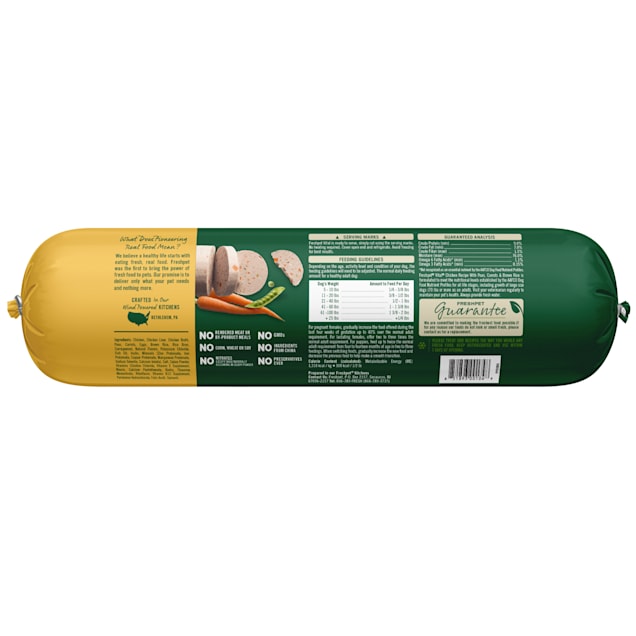Yes, fresh pet dog food can be frozen. Freezing fresh pet food can help extend its shelf life and preserve its nutritional value.
It’s important to follow proper storage guidelines to ensure the food remains safe for your pet to consume. Freezing fresh pet food is a convenient way to manage your pet’s diet and reduce food waste. By freezing fresh pet food, you can buy in bulk and portion out smaller servings as needed, saving time and money.
However, it’s crucial to handle and store frozen pet food properly to prevent contamination and maintain its quality. We will explore the benefits and considerations of freezing fresh pet food, as well as provide tips for safe and effective freezing and thawing practices.


Benefits Of Fresh Pet Dog Food
Fresh pet dog food is becoming increasingly popular among dog owners, and for good reason. This type of food offers numerous benefits that can improve your furry friend’s health and overall well-being.
One of the main advantages of fresh pet dog food is its higher nutritional value compared to traditional dry or canned dog food. Fresh food is minimally processed, which means it retains more essential nutrients, vitamins, and minerals that are vital for your dog’s health and vitality.
Fresh pet dog food also contains higher levels of moisture, which can aid in improved digestion. This is especially beneficial for dogs with sensitive stomachs or digestive issues, as it can help alleviate symptoms such as diarrhea or constipation.
Moreover, fresh pet dog food is free from artificial preservatives, additives, and fillers that are often found in commercial dog food. These additives can be harmful to your dog’s health and may contribute to various health issues over time.
By opting for fresh pet dog food, you are providing your canine companion with a wholesome, natural diet that promotes optimal health and longevity. So, if you’re considering switching your dog’s diet, frozen fresh pet dog food is definitely worth considering.
Freezing Fresh Pet Dog Food
When freezing fresh pet dog food, it’s crucial to maintain its nutritional value. One way to preserve freshness is by properly sealing the food in airtight containers to prevent freezer burn. This can extend the shelf life of the food. It’s important to label the containers with the date of freezing to keep track of freshness and usage.
How To Freeze Fresh Pet Dog Food
Yes, you can freeze fresh pet dog food to extend its shelf life. Freezing pet food can help preserve its nutrients and prevent spoilage. Ensure to store the food in airtight containers or freezer bags to maintain its quality.
| When freezing fresh pet dog food, proper packaging is crucial to maintain freshness. | Ensure to portion control the food into individual servings before freezing. |

Thawing Frozen Fresh Pet Dog Food
Frozen fresh pet dog food can be safely thawed before feeding. Thawing preserves the nutritional value and ensures a fresh and healthy meal for your furry friend.
| Fresh pet dog food can be frozen for convenience. |
| Thawing in the refrigerator gradually retains nutrients. |
| Place the frozen food in the fridge overnight. |
| Make sure to keep the food covered while thawing. |
| For quicker defrosting, use cold water in a sealed bag. |
Considerations Before Freezing Fresh Pet Dog Food
Quality of Ingredients: Ensure the freshness and quality of ingredients before freezing pet dog food.
Suitability for Freezing: Consider how well the specific type of dog food will freeze and retain its nutritional value.


Tips For Feeding Frozen Fresh Pet Dog Food
When feeding frozen fresh pet dog food, it’s important to consider the serving size for your furry friend. The appropriate portion for your dog will depend on their size, age, and level of activity. It’s recommended to consult with your veterinarian to determine the ideal amount of food your dog should be fed per day. Make sure to follow their recommendation closely.
Transitioning to frozen food should be done gradually to avoid any digestive upset. Start by incorporating small amounts of frozen food into your dog’s regular meals and gradually increase the portion over time. Observe how your dog reacts to the new food and make adjustments accordingly. Keep an eye on their appetite, digestion, and overall well-being to ensure they are transitioning smoothly.
To freeze fresh pet dog food, divide the food into individual servings and place them in airtight containers or freezer-safe bags. Label each container with the date and portion size for easy reference. When it’s time to feed your dog, simply thaw the required serving in the refrigerator.
Remember to always handle frozen food with clean hands and utensils to maintain hygiene. It’s also recommended to thaw the food thoroughly before serving, ensuring that it reaches an appropriate temperature for consumption. Following these tips will help you safely and effectively feed frozen fresh pet dog food to your furry companion.
Potential Risks Of Freezing Fresh Pet Dog Food
Freezing fresh pet dog food has potential risks that pet owners should be aware of. One of the concerns is the risk of nutrient loss. Freezing can cause some degradation of the vital nutrients in the food. This can be minimized by ensuring that the food is frozen in appropriate packaging and consumed within a reasonable timeframe.
Another potential issue when freezing fresh pet dog food is the texture and taste changes. The freezing and thawing process can alter the texture of the food, making it less appealing to some dogs. Additionally, freezing can affect the taste of the food, potentially reducing its palatability.
Despite these potential risks, freezing fresh pet dog food can also have its advantages. It can help extend the shelf life of the food and provide convenience for pet owners. However, it is important to take precautions and consult with a veterinarian to ensure that the frozen food still meets the nutritional needs of the dog.
Alternatives To Freezing Fresh Pet Dog Food
Fresh pet dog food can be safely frozen for later use. However, if you’re looking for alternatives to freezing, refrigeration is a great option. You can store fresh pet dog food in the refrigerator to keep it fresh for a longer period. Additionally, dehydrating fresh pet dog food is another alternative to freezing. This method involves removing the moisture from the food, allowing it to be stored for an extended period. Both refrigeration and dehydrating are effective ways to preserve fresh pet dog food without the need for freezing.
Frequently Asked Questions On Can Fresh Pet Dog Food Be Frozen
Can You Freeze Freshpet Refrigerated Dog Food?
Yes, you can freeze Freshpet refrigerated dog food for later use.
How Long Does Fresh Dog Food Last In The Freezer?
Fresh dog food can last in the freezer for up to six months.
How Long Does Freshpet Dog Food Last?
Freshpet dog food typically lasts for around 7-10 days in the refrigerator after opening. It’s important to check the packaging for specific storage and expiration details. Proper storage and handling can help maintain the freshness and quality of the food for your dog.
What Is The Shelf Life Of Fresh Dog Food?
Fresh dog food typically has a shelf life of 3-5 days when stored in the refrigerator. It is important to follow storage guidelines for optimal freshness.
Can Fresh Pet Dog Food Be Frozen?
Fresh pet food can be safely frozen for future use, preserving its nutritional value.
Conclusion
Freezing fresh pet dog food can extend its shelf life without compromising nutritional value. With proper storage and thawing, frozen food remains a convenient, budget-friendly option. However, always consult a veterinarian to ensure the best feeding practices for your pet.
Consider experimenting with freezing fresh pet food to see if it meets your needs.

Pingback: What Are The Advantages And Disadvantages Of Soaking Dog Food - Comprehensive Guide to Pet Care